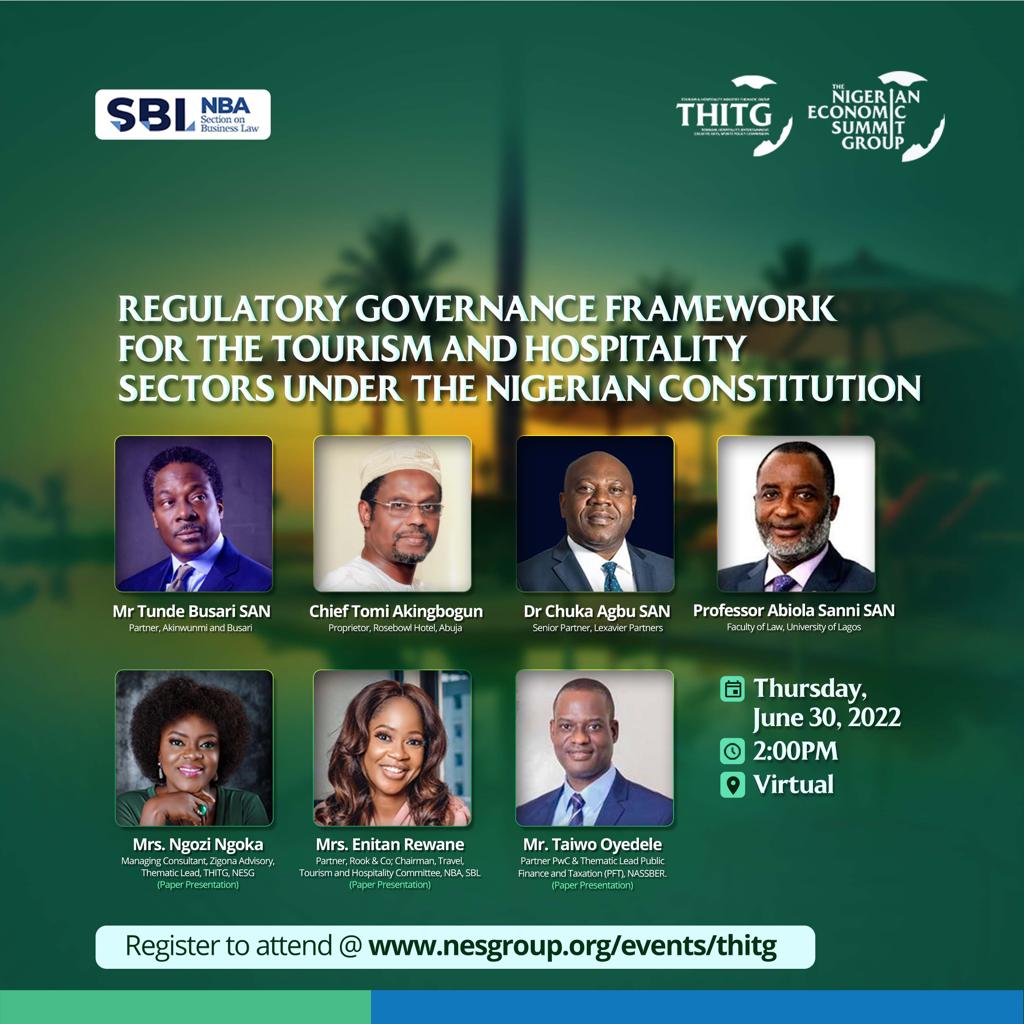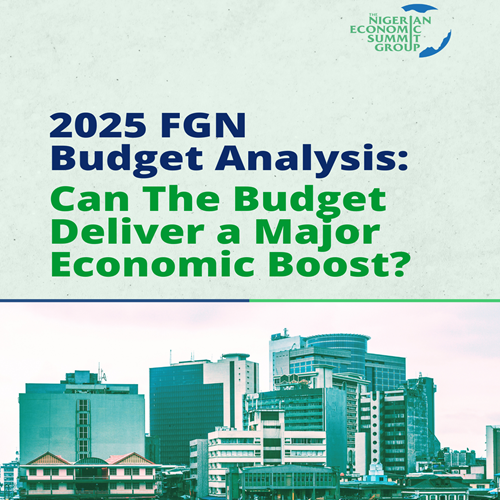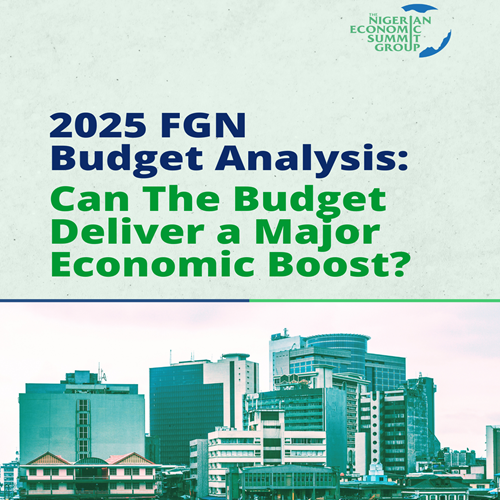Posted Fri, Jul 1, 2022 3:58 PM
NESG holds webinar to enhance Nigeria’s Tourism and Hospitality sector

The Tourism and Hospitality Industries Thematic group of the Nigerian Economic Summit Group (NESG), in collaboration with the Nigerian Bar Association Section on Business Law (NBA SL), on Thursday, the 30th of June 2022, held a webinar with the theme “Regulatory governance framework for the Tourism and Hospitality sectors under the Nigerian constitution.”
In his opening remarks, NESG Board member Mr Udeme Ufot said that the webinar is a sequel to the national forum on tourism and hospitality in Nigeria, which was held on the 19th of August, 2021. He noted that the position of the law regarding Tourism and Hospitality under the Constitution of the Federal Republic of Nigeria and how the judgment of the Supreme Court (SC) in the Honourable Minister for Justice and Attorney-General of the Federation vs Honourable Attorney-General of Lagos State (the “Hotel Licensing Case”), has impacted the sector’s development and growth.
Furthermore, Mr Ufot noted that the tourism and hospitality sector is worth over 1.3 trillion Naira and that all stakeholders needed to examine and adopt best practices to optimize potential benefits. He reiterated the NESG’s commitment to collaboration, especially in light of the partnership with the NBA SBL to provide a platform for engagement to dissect the constitution and sectoral regulations related to the tourism and hospitality sector in Nigeria and the diaspora as a means of encouraging best practices.
Mr Ayuli Jemide, in his remarks, said that it was essential to look at how laws can provide investments and noted the need to improve access to tourists, especially because certain countries have citizens of about 40 to 45 countries arriving in their country visa-free or visa on arrival.
The permanent secretary Federal Ministry of Information and Culture, Dr Ifeoma Anyanwutaku, said that Nigeria is blessed with monuments, natural plains and various endowments that should make it an attractive destination for tourists. “In 2013, tourism contributed 757 billion to Nigeria’s GDP. The Nigerian tourism sector has greater potential than the agriculture, solid minerals and oil and gas sectors. Different countries have developed their industry in a manner that supports economic growth, which is why government’s involvement in hospitality and tourism commenced with the founding of Nigeria’s Tourist Association registered in 1964,” she stated.
Furthermore, Dr Anyanwutaku reiterated the need to review existing legislative frameworks and the creation of a one-stop centre for licensing and permit requirements to eradicate confusion, engendering desired growth, and attract local and foreign investments to Nigeria.
In his goodwill message, the President of the Nigerian Bar Association (NBA), Mr Olumide Akpata, said that the travel and tourism sector is significant and peculiar. As such, it needs a well-defined regulatory framework to operate and contribute its quota to National development, noting that the NBA will continue to champion the role of lawyers and encourage collaboration with regulators to ensure that legislations promote the advancement of the tourism and hospitality sector.
Managing consultant Zigonia Advisory, Ms Ngozi Ngoka, and thematic lead THITG of the NESG, in her presentation, stated that the Tourism and hospitality sector contributed 1 in 4 jobs worldwide in 2019. She revealed that various regulatory frameworks in the industry include competition, health and hygiene, physical, licensing, etc.; noting that such regulations help protect the legitimate interest of businesses, support the sectors to compete globally, provide safeguards and ensure good social and environmental outcomes.
Ms Ngoka also identified specific gaps in existing regulations, including the multiplicity of taxes, lack of a Nigerian institute for hospitality and tourism (NIHOTOUR) bill, lack of sectoral relief, lack of regulatory framework for travel agencies and operators, insufficient collaboration and absence of streamlined legislative standards across various states. she recommended the deployment of a fairer taxation system through the use of digital platforms and speedy adjudication of consumption tax and VAT issues.
Partner, Rock & CO and chairman, Travel Tourism and Hospitality committee of the NBA SL, Mrs Enitan Rewane, said that specific financial regulations such as the Company and Allied Matters Act (CAMA) and the company income Tax (CIT) regulate the sector alongside the National Tourism Development Corporation (NTDC) act and other industry-specific regulations. She noted that with the supreme court ruling, States have the power to regulate tourism and hospitality in their states but reiterated the need for synergy between states and the federal government to improve regulations.
In his presentation, Mr Taiwo Oyedele, Partner, Pwc and thematic lead public finance and taxation, National Assembly Business Environment Roundtable (NASSBER), said that there is a need to demand value and government at all levels must demonstrate and show other stakeholders in the sector improved activities to justify tax collection. In the same vein, Chief Tomi Akingbogun, proprietor of Rosebud hotel Abuja, said that government is in dire need of revenue from other sources resulting in different agencies working to increase revenue generation, which has resulted in multiple uncoordinated taxes and the inherent friction between practitioners and regulatory agencies.
Mr Tunde Busari (SAN) said that with the supreme court ruling, the FG could no longer establish a state tourism board. However, he noted that the NTDC can still carry out some tourism responsibilities, including encouraging tourism in Nigeria. He noted that the NTDC could promote research in tourism and assist in developing historic sites and other natural spots within Nigeria.
Find a blog post
Latest Releases

2025 FGN Budget Analysis: Can Th .. Read
20 hours ago

2025 FGN Budget Analysis: Can Th .. Read
20 hours ago

Development as Attitude: A Natio .. Read
2 days from now
